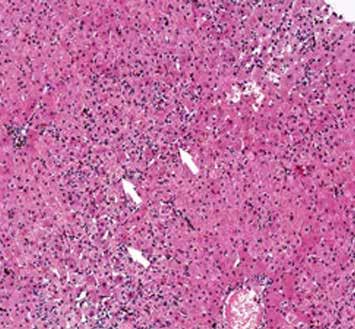
2 minute read
INFECTIOUS DISEASES
EqPV-H Antibodies Detected More in Older Horses and Condition Was Not Associated with Hepatitis
Researchers testing sera found that equine parvovirus-hepatitis (EqPV-H) antibodies and DNA were frequently detected in older Austrian horses that did not have an associated hepatitis.
The discovery of this condition was relatively recent, so veterinary understanding is in its infancy. Any information regarding prevalence, geographical distribution, genetic diversity, pathogenesis and risk factors enhances understanding of this potentially fatal infection, the researchers said.
In this cross-sectional study, the researchers use polymerase chain reaction (PCR) to analyze sera from 259 healthy horses and 13 healthy donkeys for the presence of EqPV-H antibodies and EqPV-H DNA. Associations between infection status, sex, age and concurrent equine hepacivirus (EqHV) infection were described.
EqPV-H usually is associated with equine serum hepatitis, so they also measured glutamate dehydrogenase (GLDH), gamma-glutamyl transferase (GGT), bile acids and albumin concentrations and compared the results between horses with active infection and PCR-negative horses. Phylogenetic analysis of the EqPV-H variants was performed.

Liver biopsy sample from a horse with EqPV-H. Individual and small clusters of lymphocytes are scattered about the parenchyma (arrows), indicative of lymphocytic lobular hepatitis.
Source: Emerg Infect Dis. 2018:24(2).
In horses, EqPV-H seroprevalence was 30% and DNA prevalence was 8.9%. One horse was co-infected with equine hepacivirus. There was no evidence of EqPV-H in donkeys. Horses older than 16 years of age were 8 times more likely to have active EqPVH infection compared with horses that were 1 to 8 years old (P=0.002; OR=8.19; 95% CI=1.79 to 37.50), and were 3 times as likely to have active EqPV-H infection compared with horses 9 to 15 years of age (P=0.03; OR=2.96; 95% CI=1.08 to 8.17).
GLDH, GGT, bile acids and albumin concentrations were not significantly different between horses with active infection and those without.
“Our findings have identified a significantly higher chance of active EqPV-H infection in 16–to 31-year-old horses, compared with 1-to-8-year-old horses, as well as 9-to15-year-old horses,” the researchers wrote. “With every increase of 1 year in age, the risk of active EqPV-H infection is 1.1 times higher. The risk becomes increasingly greater with increasing age, culminating in the highest risk in horses of advanced age.”
The EqPV-H variants identified in this Austrian population of horses showed high similarity to sequences worldwide, they said.
For more information:
Badenhorst M, de Heus P, Auer A, et al. Active equine parvovirus-hepatitis infection is most frequently detected in Austrian horses of advanced age. Equine Vet J 2021 Mar 11 doi: 10.1111/evj.13444. https://beva.onlinelibrary.wiley.com/doi/10.1111/evj.13444
Divers TJ, Tennant BC, Kumar A, et al. New parvovirus associated with serum hepatitis in horses after inoculation of common biological Product Emerg Infect Dis. 2018:24(2) https://wwwnc.cdc.gov/eid/article/24/2/17-1031_article






